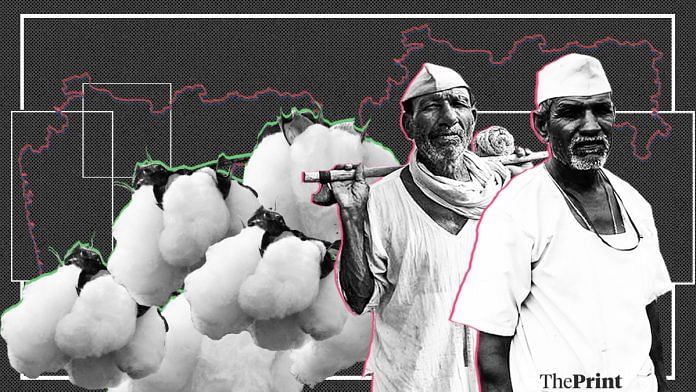Maharashtra farmers’ protest movement in favour of GM seeds has now spread to 11 districts. The pro-GM movement started when farmers in Akola and Buldhana districts planted the unapproved HT Bt cotton, defying a ban by both the central and state governments. This comes in the backdrop of a crackdown by the Haryana government on the illegal cultivation of Bt brinjal.
ThePrint asks: More Maharashtra farmers demand GM seeds: Is Indian policy dictated by politics or science?
We don’t want any govt subsidy. We want freedom to choose new technologies
 Ajit Narde
Ajit Narde
Head, Shetkari Sanghatana
Since the economic liberalisation in 1991, new technologies have made their way into various industries, including the farming sector. GM technology proved beneficial for the farmers – crop productivity went up and the produce fetched better prices in the international market.
But the Indian government’s policy, which should ideally be based on science and farmers’ interests, is instead based on the politics of restricting the growth of farmers. This has been seen during the previous Congress governments, which banned cultivation of Bt brinjal. The Narendra Modi government is unquestioningly following the previous regime’s policies.
All political parties are anti-farmer, and farmers’ welfare is not on their agenda. Instead, they want farmers to use questionable technologies, such as cow urine and dung.
We don’t want any subsidy from the government or any price control measures, we just want independence from any regulation in the farming sector. We want freedom to choose new technologies that will actually help the farmers, and we desire access to international free markets.
For instance, the herbicide-tolerant Bt cotton, which is currently not legal in India, reduces the cost of weeding significantly. Given such benefits, one needs to ask why the government is not letting farmers access such technology, even when they are ready to bear the brunt of any potential pitfalls from its use.
Neither science nor reason can support the use of toxic technology by farmers
 Kavitha Kurganti
Kavitha Kurganti
Co-convenor, Alliance for Sustainable & Holistic Agriculture
In India, any decision on cultivation of GM crops is taken ostensibly on a case-by-case basis. The final decision is taken after adequate scientific risk-assessment of the crop.
But illegal cultivation of unapproved GM seeds is not backed by any science. What we are witnessing in Maharashtra is a symbolic drama by a small group of farmers to cultivate GM crop, which is played up by the media, even as other prominent, large farmer unions ask the government to not release GM seeds.
No science or reason can support the use of toxic technology by farmers, especially when alternatives are available.
Pest management, for instance, is very much possible without the use of chemical pesticides or transgenics. This really is post-modern science.
Similarly, instead of subsidising unsustainable technology like chemical fertilisers, government can subsidise farm labour for some operations, thereby creating a win-win situation for farmers and agricultural workers. That would be good science too.
In fact, the question raised on India’s policy on GM seeds, based on a fringe group’s demands, is exactly how the biotech industry’s strategy plays out – get illegal planting done, present a fait accompli and get approvals. The government should not succumb to any such pressure.
There is no policy decision needed in this matter, either based on politics or science. All that’s needed is implementation of the existing regulation.
Also read: Don’t penalise farmers for pro-GM crop protest, address their concerns instead
Lifting ban on Bt brinjal & GM mustard must top Modi govt’s agenda for science & farmers’ welfare
 Barun Mitra
Barun Mitra
Public policy researcher and founder, Liberty Institute
Science is hardly ever a basis on which policy is made — not just in our country but across the world. This is because science can at best help us understand theories and hypotheses, but whether or not a policy is constituted will always be governed by politics and social issues.
In the case of genetically modified (GM) seeds, our politicians have always felt that there is more political capital to be gained by banning instead of approving GM foods. Similar to when the original Bt cotton was developed, we are hearing the same old stories now with new generation of HT Bt cotton and Bt brinjal crops. Indian politicians have learnt absolutely nothing because things are just as they were nearly 30 years ago, when the so-called liberalization kicked in.
I would like to hope that things will shape up differently this time around. I believe what we should be aspiring for is a policy that is crop-neutral and technology-neutral. We cannot be having satyagraha every time there is a new crop or technology in question. If the Narendra Modi government really wants to show its commitment to science, farmer’s welfare, doubling farm income, then approving Bt brinjal and GM mustard should be the first thing on its agenda. After all, both these crops passed all regulatory processes but politics is what acted as a roadblock.
On the one hand, the government says they are worried about the health and safety of consumers so they continue to test the GM seeds indefinitely. On the other hand, they have imposed price controls telling farmers that they want them to access seeds at a lower cost when what they actually need is a new generation of seeds to truly benefit them.
Also read: Cancer fighting genetic tool ‘Crispr’ is now being used for improving quality of crops
The farmers’ ‘satyagraha’ for GM seeds is the product of paid news by Shetkari Sanghatana
 Kishore Tiwari
Kishore Tiwari
Chairman and MoS, VNSSM-state task force for farmer welfare
Farmers don’t want to use the herbicide-tolerant Bt variety of cotton, because it requires them to use dangerous weedicides. This ‘satyagraha’ is the product of paid news by the Shetkari Sanghatana. Use of weedicides in cultivation of HT Bt cotton poses not only a significant cost for farmers but also environmental and healthcare concerns. They have been deemed as carcinogenic and reports of cancer spreading due to the uncontrolled spraying of weedicide have emerged.
Studies have found HT Bt cotton being responsible for suicides among farmers, because the significantly high yield substantially fell just after two years, while causing significant environmental damage to soil and water bodies.
Furthermore, as we saw previously with the spread of Bt1 and Bt2 cotton varieties, there emerged the existence of vertical and horizontal monopolies at the hands of the World Bank, the WTO, the American farmers who supplied the GM seeds, and also the government and media. The single multi-national corporation, which introduced Bt cotton, managed to garner 90 per cent of the distribution and control, which resulted in significant increase in cultivation costs. As a consequence, many farmers became trapped with no way out.
If such a technology is to exist, it should come through either the Indian government or Indian universities. Our ultimate priority should be to make sure that farmers have the liberty to choose what technology they want, and not have to comply with the monopoly created by a particular MNC.
By Fatima Khan and Shauryavardhan Sharma.




Consumers health concern prevails over politics and science. In the name of science, US / Europian companies think that they can infuse any things on India for their benefit. If GM vegetables are allowed for cultivation, this may boost economy or increase income time being but it’s repercussions will cost the nation by the way of increase in health care cost which would caused by consumption of such GM products. Why these products are banned in American / European countries? Such damn thing shouldn’t be permitted in India ever. I hope Indian Govt. should not succumb to pressure of such fake agents who has no knowledge on GM products and their repercussions.